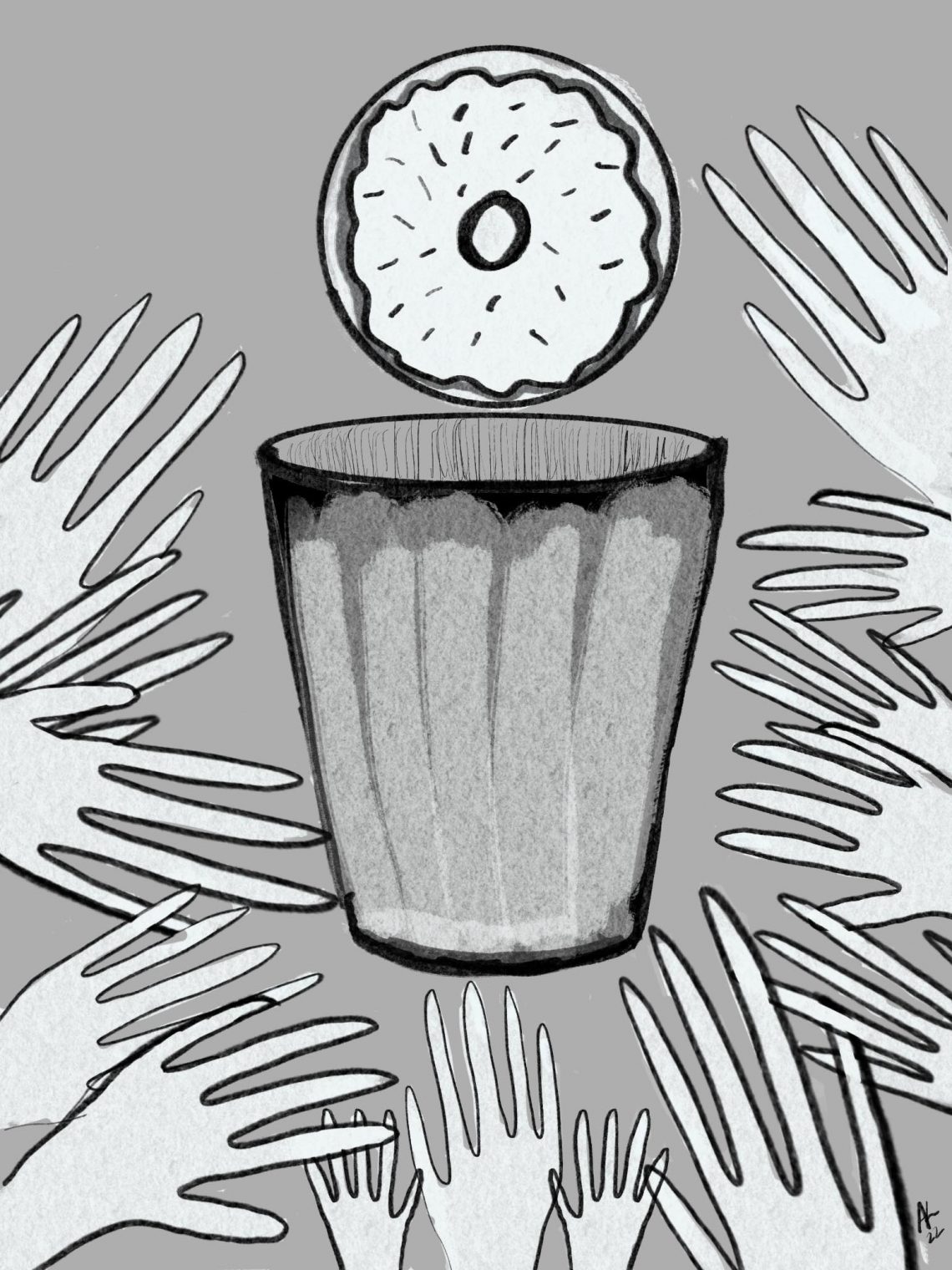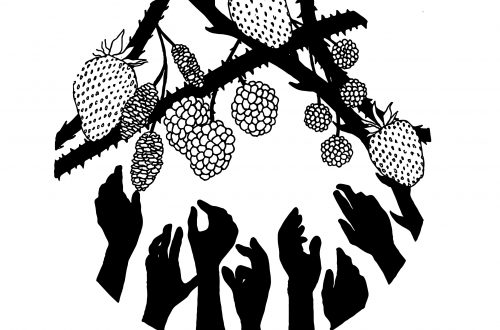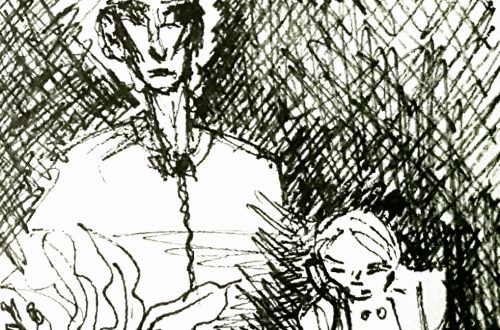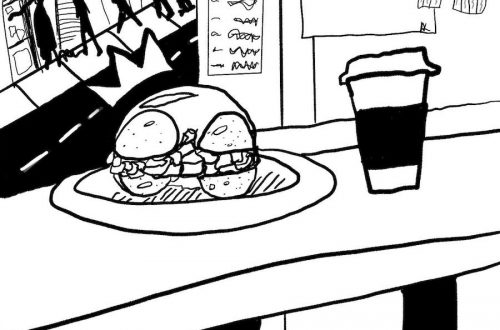by Nate Crawford
Nate’s story appears in episode 34 of The Dirty Spoon Radio Hour.
My career selling donuts started right in the major leagues. My first-day training was the morning shift in Center City Philadelphia. The manager patiently answered my questions while her hands moved a mile a minute making coffee, cleaning countertops, and preparing a bulk order someone had called in the day before. Once open, the customers came in quickly while I took notes and made coffee. As people were piling into an ever-growing line, I noticed something exciting about the mood in the room. This small, hectic downtown shop felt incredibly cozy. The manager knew every other person who came through the doors and would catch up with regulars as they made their way through the line. The location was small and it was busy, but it was warm and welcoming.
A couple weeks later, I was relocated to the restaurant’s counter kiosk in a national Grocery Store chain. This was a stark change. Our lunch counter didn’t have the same friendly charm of the downtown location. People were less interested in hanging out and chatting in the direct wake of customers pouring through the checkout lanes.
For customers, the biggest difference was that we were barred from selling coffee with our donuts. The store had its own coffee bar and didn’t want any competition. On busy Saturday mornings, customers would be understandably upset when– after they waited in line for donuts–they then needed to join an even longer line for coffee. The rule was that we were not allowed to sell anything that customers could find somewhere else in the store. Technically, we could have sold state secrets and cyanide as long as we didn’t offer anything people could also find in the grocery store’s bakery department.
Working inside a large chain also added another layer of rules to follow. The Grocery Store enforced stricter nutritional guidelines, so we occasionally had to substitute ingredients or forgo a fluorescent Halloween donut with an artificial dye. That said, most rules–especially around food safety– didn’t change at all. Whether you work in a grocery store or a restaurant, you can’t start licking the food you give to customers. The government is a pretty serious killjoy about that sort of thing. For me, the biggest difference was that at the Grocery Store location, we were not allowed to give away free food under any circumstances. Even if the President showed up on the verge of a diabetic coma, some secret service agent was going to need to flash some cash before
we could help. The restaurants did a pretty steady business, but on the occasional slow day they could hand out donuts as they got closer to closing time. That was not an option for us. On an average day, we were left with around a half dozen leftover donuts. If you start with over two hundred donuts and end with seven, that number could feel almost negligible. But, if you take home seven donuts most nights, you are drowning in donuts. And that’s on an average day.
Some days we sold out without problem. Some days, however, it seemed like all of America had turned its back on donuts. This left a major question about what to do with those leftovers. The rules were all about location. At the end of the day, the employees at the donut counter could take any donuts that hadn’t sold. If we gave out our donuts on the Grocery Store property, that was considered theft. But, once off of the Grocery Store property, we could do whatever we wanted. This policy kind of reminds me of children’s birthday parties I’ve seen where a kid named Dylan tries to take partial ownership over the present he just gave away. The difference, of course, is that the grocery store had armed guards to enforce whatever rules they laid out. Give Dylan a couple jacked dudes with tasers and I’m sure people would start to take him a little more seriously when he lays out his dos and don’ts of RC car ownership.
The obvious home for the seven or so donuts we had at the end of an average day was to give them to the employees of the grocery store, but even that was a no-go. Not only were the employees on Grocery Store property (a violation of the rules), we were specifically forbidden from giving free food to the store employees. The Grocery Store got a portion of each donut sale we made, so they wanted to make sure that the employees were buying their own donuts. I understand this impulse. When I worked at a grocery store, I still had to buy carrots. But, I think they took it too far. I probably only sold one donut a week to Store employees. It seemed more than misguided to throw away donuts to preserve that weekly twenty-cent commission. I realize that some people might be wondering why we don’t give these donuts to a food bank or homeless shelter. I asked that, too. I was told that a couple managers had made some inquiries around town, but the forces fighting hunger in Philadelphia had better uses for their time than redirecting a small, inconsistent stream of dessert circles before they went bad in 24 hours. Fair enough.
So, I would take the leftover donuts with me. I took donuts to bars, to shows, to meetings and rehearsals. I gave donuts to everyone from old friends to strangers on the street. Sometimes, if we had a lot of extras, I found someone to take them to work the next day; an option that was not available to me because my workplace was already full of donuts. Most of the time, however, if I was working the closing shift (and thus collecting the leftover donuts), I was going straight home. As such, an embarrassing number of these leftover donuts went straight into my face. And after that, the rest ended up in the trash. One day, the nearby hummus counter started leaving leftovers in the break room for the Grocery Store employees. A couple weeks went by and no one asked the hummus mongers to stop. We asked our manager and got the go-ahead to leave leftover donuts, too. We were thrilled by the change. We became benevolent donut gods inside the store and we could stop force-feeding fried sweets to our friends and relatives. For a week or two, I was a little worried that we might get in trouble. But, when I noticed that some of the in-store managers were making small talk with me about donut flavors, I figured we were in the clear. The gears of corporate bureaucracy sometimes move slowly, but they do move. Specifically, someone from the Grocery Store sent our manager an email saying that they knew we were leaving leftover donuts in the breakroom, they considered that theft, and if we did it again we would be banned from the store. I believe they had us on camera, so there wasn’t much room to argue or make excuses or try to throw the hummus people under the bus. Their decision baffled me at the time and still baffles me now. We were giving our donuts to their employees. And we weren’t keeping donuts from customers. We were closed. The day was over. The math
involved in understanding how that is not only a bad thing, but is stealing from them is mind
numbing in the worst way.
Sometimes I worry that this is the ultimate goal of bureaucracy; to move the consequences of decisions so far away from the people making them that there isn’t room for flexibility or exceptions. Your local business owner might have trouble looking you in the eyes and saying that they can’t help you, but the employee at your nearby box store is telling you the truth. They can’t help you. There are strict rules in place to make sure they can’t help you. And those rules are enforced by people the two of you will never meet. I realize that there are far more dire implications of this phenomenon than wasted donuts. I imagine that if I saw the amount of produce that that Grocery Store throws away each week, it would be humbling and heartbreaking. The donuts are just another sad example of a corporate structure that would rather throw things away than give them to their own employees.
We worked for the restaurant, so the Grocery Store couldn’t fire us. That said, they still had armed guards who could throw us out whenever we showed up for work. None of us felt good about it, but it didn’t seem like a threat worth testing. So, we went back to taking our donuts home with us and when we had more donuts than we could handle, we threw them away. All to protect the Grocery Store’s weekly windfall of 20 cents.
Original artwork by Alex Knighten
 About the Author
About the Author
Nathan Crawford is 6’6″ and used to be afraid of cows. Now an adult, he is a writer living in Chicago. He writes the East Nebraska Secret Commune Social Quarterly.






